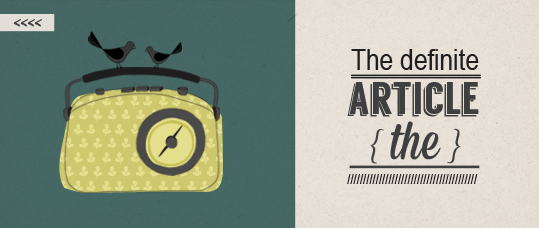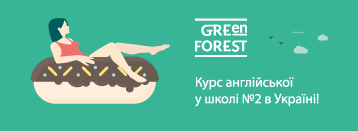The definite article the
Perhaps the biggest number of rules about article usage exists for the definite article the. Let's spend some quality time together and listen to them.
In this podcast you will hear common rules about using the definite article the. For more information about the articles listen to our podcasts “The indefinite article” and “Zero article”.
The definite article doesn't have any limits in usage with nouns. We can place it in front of singular or plural nouns, countable or uncountable. But as it was said before it does have much more rules than the indefinite article. The definite article the is used:
in front of any noun the listener already knows about. This is when we mention it the second time.
He's got a flat and a car. The car is quite old and the flat is really small.
Note, when we mention something the first time we use the indefinite article a/an.
- when the existence of something is obvious because of the context in which it is mentioned
After work I went outside the house and read for a while in the garden.
Here is the list of most things when it is clear what we mean:
-
- if we are in the room or flat we use the with the following words
the door, the ceiling, the floor, the carpet, the light, the roof, the garden, the kitchen, the bathroom, the toilet
-
- if we are talking about town facilities we say
the centre, the station, the airport, the town hall, the bank, the post office.
-
- with features of the country
the coast, the border, the beach, the country(side), the jungle, the sea
- to describe where the things are we use the with the following phrases
at the top, at the bottom, on the right, on the left, in the middle, in the background, in the foreground
- with parts of a day we use the
in the morning, in the afternoon, in the evening
but we say at night
- when we mean something specific
The toy with the red and black stripes is mine.
We mean only this toy not others.
Can you lend me the pen that you gave me yesterday?
We want a particular pen.
- before things generally regarded as unique
the sun, the moon, the sea, the sky, the Arctic Circle, the environment,
the capital, the air, the ground, etc.
- with superlative adjectives because of their unique nature
Today is the best day of my life.
- in front of ordinal numbers
You are the first famous person I have ever met in my life.
- with dates we use the because they contain ordinal number
Yesterday was the 13th of July and tomorrow will be July the 15th.
- with decades and centuries
I was born in the 1960's in the crazy 20th century.
- before services of a country or city
the police, the army, the fire brigade
- in front of adjectives to describe a group of people
The rich sometimes help the poor.
The old need our help.
- with nationality adjectives when we mean the people of that country
The Romans built a lot of roads in Europe.
The Spanish often have late dinners which are followed by dances and songs.
Note, single examples are not formed in the same way.
I work with an Englishman he seems like a nice guy.
- in titles without proper names
I would like to meet the Queen of England.
but I would like to meet Queen Elizabeth.
Elizabeth is a proper name that's why no article is needed.
- with place names, especially with … of …
I studied at the University of Leeds.
but at Leeds University
He would like to visit the Tower of London.
but London Tower
- in proper names consisting of noun or adjective + noun
the English Channel, the White House, the Rolling Stones, the Berlin Philharmonic Orchestra, the British Museum, etc.
- with historical events and periods
Last weekend we watched a movie about the Vietnam War.
The Roman Empire had a big influence on European development.
- with the names of hotels (the Hilton), cinemas (the Odeon), theaters (the Globe), museums (the British Museum), galleries (the Tate Gallery)
In London he always stays at the Savoy Hotel and in the evening goes to the Globe Theatre.
- for newspapers
Sometimes I read The Times and The Baltimore Sun.
- with the names of musical instruments
Alex can play the guitar, the piano and the trumpet.
- with many forms of entertainment, for example
the cinema, the movies, the theatre, the circus, the ballet, the opera and the radio
but not TV
He prefers going to the cinema alone.
I often listen to the radio and sometimes I watch TV.
- with the word ‘the same'
Your pullover is the same colour as mine.
Your twins look the same. I can't see any difference.
- with words only, last, first used as adjectives
He was the only friend I trusted.
She was the first person to arrive.
- in front of inventions
The Internet and the computer have changed our lives.
The mobile phone has greatly influenced people's communication.
But if we mean them as appliances we use a/an.
Have you got a mobile phone?
Can I buy a new computer?
- with family names
The Simpsons invited us to the party yesterday.
- the definite article is used with a lot of geographical names such as: oceans, seas, rivers, channels, canals, bays
the Pacific Ocean, the Atlantic, the Mediterranean Sea, the Black Sea, the Amazon River, the Dnipro River, the Bay of Bengal, the Hudson Bay, the Panama Canal, etc.
Note, we use the with all water bodies except lakes. No article is needed before the names of lakes.
Lake Victoria, Lake Como, Lake Baikal, etc.
- group of islands
the Maldives, the Canaries, the Caribbeans, etc.
But we don't use any articles in front of one island.
Easter Island, Rhode Island, etc.
- mountain chains
the West Indies, the Rockies, the Carpathians, the Alps, etc.
Note we don't use any articles before a single mountain.
Mount Everest, Mount Goverla, Mount Cook, etc.
- deserts
the Sahara, the Gobi, the Karakum, etc.
- countries with plural names, federations and unions
the United States, the United Kingdom, the United Arab Emirates, the Netherlands, the Philippines, the Russian Federation, etc.
- points of the compass and areas
the North, the South, the East, the West, the Far East, etc.
Well, of course, there are a lot of rules about article usage, but the more you listen, read and speak the faster you will start using articles in proper situations.
Thanks for listening.
















